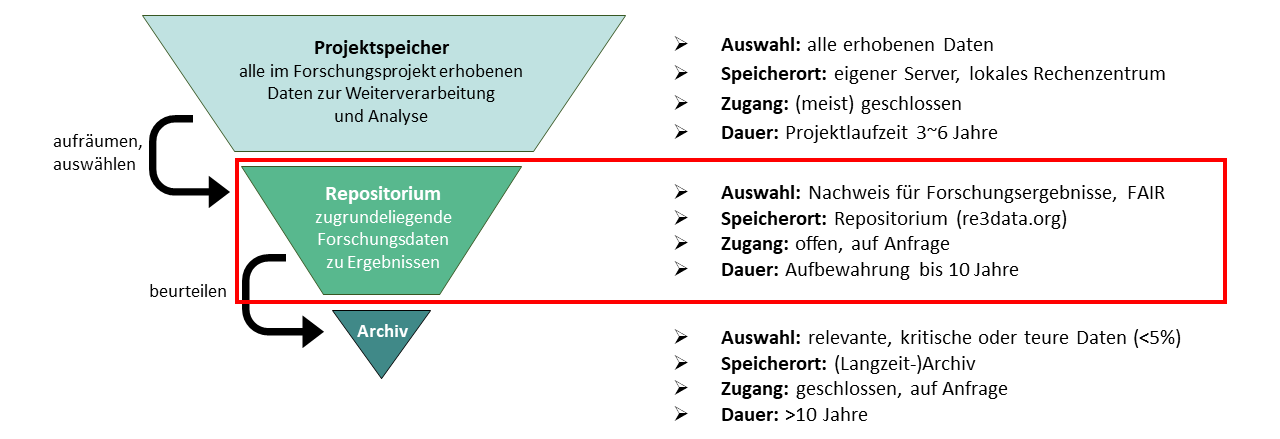REFODAT
The slides from the workshops held in spring 2025 provide a comprehensive introduction to the functionalities of REFODAT. You will learn how to select and prepare research data for publication, how to publish it in REFODAT, and how to use and navigate REFODAT.
- 27.03.25 09:00 Workshop (Deutsch - Folien)
- 29.04.25 14:00 Workshop (Englisch - Slides)
The REFODAT project, short for Repository for Research Data in Thuringia, arose from the Thuringian digitization strategy in the higher education sector 2021-2025 (Thüringer Digitalisierungsstrategie im Hochschulbereich 2021-2025). It enables researchers in Thuringia to store research data (e.g. documents, tables, images, videos, measurements, models) and make them available for reuse. The repository thus complements the Digital Library of Thuringia (Digitale Bibliothek Thüringen - DBT for short), in which researchers from Thuringia can publish their research results (e.g. articles, reports). Data publications in REFODAT and publications based on the data can be linked and referenced.
The strategic development of REFODAT is the responsibility of the Research Data Management Working Group (AG Forschungsdatenmanagement) of the Cooperation Network of Thuringian University Libraries (ThHoBi for short), which consists of representatives of the IT Center of the Thuringian Universities (IT-Zentrum der THüringer Hochschulen - HS-ITZ for short), the Library Service Center (Bibliotheksservicecenter - BSC for short) and the Thuringian Competence Network for Research Data Management (Thüringer Kompetenznetzwerks Forschungsdatenmanagement - TKFDM for short). The REFODAT system is based on MyCoRe - MIR and is developed by the Thuringian University and State Library (ThULB) and hosted by the HS-ITZ.
REFODAT has the classic functionality of a repository. Files can be uploaded and linked to descriptive metadata (such as title, authors, descriptive text, dates, keywords or linked publications, datasets and other resources). A Digital Object Identifier (DOI for short) is created and registered in DataCite. In contrast to other discipline-agnostic repositories (such as Zenodo), the following special functions are also supported:
- Users can log in with their local university login (Shibboleth).
- The research data is stored in Thuringia.
- There is an automated quality check (for the file formats used and the completeness of the mandatory metadata).
- In cooperation with the data authors, an editorial team checks the submitted research datasets are intellectually.
- There is no storage limit (for comparison: Zenodo has a storage limit of 50GB, 100GB per dataset on request).
- Very large datasets can be submitted via storage media.
- When creating a dataset, metadata can be imported using an existing Digital Object Identifier (DOI for short).
- Data records do not necessarily have to be uploaded to the system, but can also be registered and linked to an external storage location. For example, to provide a complete overview of the data records of a workinggroup.
During the project, data is usually in the active processing phase. During this time, data should preferably be stored on your own storage (such as at the chair, faculty or institute) or on storage provided by the local data center (such as project drives or Nextcloud). REFODAT is not a project drive! The system is a repository solution (see graphic below) that stores (selected) research data after when the project has ended. They are stored in REFODAT in such a way that they comply with the FAIR principles (Findable, Accessible, Interoperable, Reusable) and are thus available as evidence for research results based on them. The repository ensures the availability of the data for at least 10 years and thus meets the requirements of good scientific practice. After the 10-year period or as an alternative to the repository, an archive can also be used. REFODAT backs up its datasets according to quality specifications and can export them as SIP archives in order to deliver them to digital archives.

Thuringian researchers should always use REFODAT to register their research data. Whether the data should also be stored in a research data center or another repository for better visibility or due to special requirements (e.g. moderated access to sensitive qualitative data or similar) must be decided by the researchers on a case-by-case basis. The re3data register provides an overview of more than 3000 research data repositories, their respective terms of use and the services provided. In our Handreichung we have set out what to look for when deciding on a research data repository. If no subject-related repository can be found via the register, the subject consortia of the National Research Data Infrastructure (NFDI for short) can also be contacted.
Detailed information on the project, in particular the technical background and planned future functions, can be found in the Konzeptpapier (in German)
Frequently Asked Questions (FAQ)
When will REFODAT be available?
The system is available since November 1st, 2024 and includes basic functionalities. Further functions will be integrated in the course of 2025.
Can I upload my data records during the project?
If the project plans to publish research datasets while the project is still running, publication in REFODAT is recommended. Even if the system allows datasets to be uploaded and shared with collaborators in preliminary drafts, this is only recommended for data that will be published in the near future. Your institution's own storage or the local data center should be used for processing and analyzing the data.
Do I have to upload my research data to REFODAT in Thuringia?
In principle, researchers are free to decide when, where and whether to publish research data. The published statements and guidelines of professional societies, research funders, the research data policy of their own institution and, if applicable, the publication organ, their own data management plan should guide researchers when taking this decision.
In order to record research performance in Thuringia, it is recommended that all published research datasets created with the help of persons or institutions in Thuringia be registered in REFODAT. This helps with reporting and also has an impact on financial recognition by the state and third-party funding bodies.
